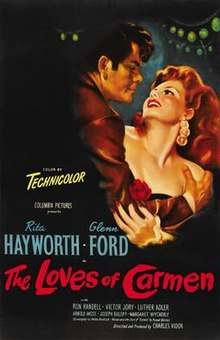The Loves of Carmen (1948 film)
The Loves of Carmen is a 1948 American drama romance film directed by Charles Vidor. The film stars Rita Hayworth as the gypsy Carmen and Glenn Ford as her doomed lover Don José.
| The Loves of Carmen | |
|---|---|
 Theatrical release poster | |
| Directed by | Charles Vidor |
| Produced by | Charles Vidor Rita Hayworth |
| Screenplay by | Helen Deutsch |
| Based on | Carmen 1845 novella by Prosper Mérimée |
| Starring | Rita Hayworth Glenn Ford |
| Music by | Mario Castelnuovo-Tedesco |
| Cinematography | William E. Snyder |
| Edited by | Charles Nelson |
| Color process | Technicolor |
Production company | The Beckworth Corporation |
| Distributed by | Columbia Pictures |
Release date |
|
Running time | 97 minutes |
| Country | United States |
| Language | English |
| Budget | $2.5 million[1][2] |
| Box office | $2.5 million (US rentals)[3] |
The Loves of Carmen was publicized as a dramatic adaptation of the novella Carmen by Prosper Mérimée and is otherwise unrelated to Georges Bizet's opera Carmen. It is a remake of the 1927 film of the same name, which was directed by Raoul Walsh and stars Dolores del Río and Victor McLaglen.
Plot
Loosely following the plot of the novella, this story follows the wild gypsy's adventures as a siren and bandit. Carmen (Rita Hayworth) lures an innocent soldier (Glenn Ford) to his ruin, getting him expelled from the army. He then turns to banditry, killing Carmen's husband (Victor Jory) and others. The drama culminates in an ending with the innocent soldier repenting of his sins and dying.
Cast
- Rita Hayworth as Carmen (singing voice was dubbed by Anita Ellis)
- Glenn Ford as Don José
- Ron Randell as Andrés
- Victor Jory as García
- Luther Adler as Dancaire
- Arnold Moss as Colonel
- Joseph Buloff as Remendado
- Margaret Wycherly as Old Crone
- Bernard Nedell as Pablo
- John Baragrey as Lucas, a bullfighter
1927 film
- Dolores del Río as Carmen
- Victor McLaglen as Escamillo
- Don Alvarado as Don Jose
1917 film
- Pola Negri as Carmen
- Harry Liedtke as Don José
Production
This was the first film chosen and co-produced by Hayworth's production company, the Beckworth Corporation, which gave her approval over her material and a percentage of the film's profits. As co-producer, Hayworth hired her father, the dancer Eduardo Cansino, to help choreograph the traditional Spanish dances. Also, her uncle José Cansino can be seen as her dance partner in one scene, and her brother Vernon Cansino has a bit part as a soldier.
Ron Randell, recently signed to Columbia, was billed third.[4]
The musical score of the film was composed by Mario Castelnuovo-Tedesco.
See also
References
- Frank Daugherty (Jan 9, 1948). "Letter from Hollywood". The Christian Science Monitor. p. 4.
- Variety 18 February 1948 p 14
- "Top Grossers of 1948", Variety 5 January 1949 p 46
- Vagg, Stephen (August 10, 2019). "Unsung Aussie Actors – Ron Randell: A Top Twenty". Filmink.
External links
- The Loves of Carmen on IMDb
- The Loves of Carmen at AllMovie
- The Loves of Carmen at the TCM Movie Database
- The Loves of Carmen at the American Film Institute Catalog
- Review of film at Variety